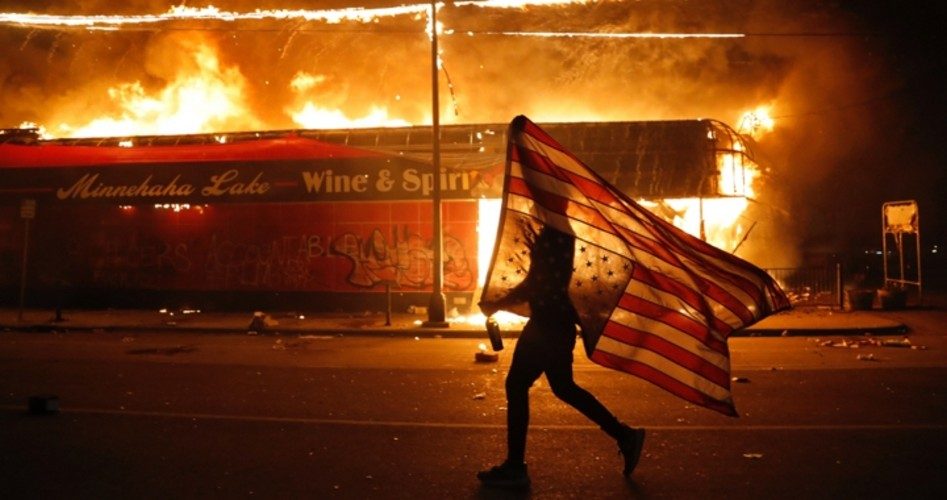
John Adams said, “This day should be celebrated with bonfires and fireworks.” He was referencing the passage of Richard Henry Lee’s resolution of independence by the Continental Congress on July 2, 1776, but Americans soon applied his wishes to the adoption of the Declaration of Independence on July 4, 1776, in which 13 British colonies jointly declared that they were seceding from the British Empire.
I have found no record that Adams urged Americans to celebrate looting or the wanton destruction of private property on every 4th of July, while eating hot dogs and listening to patriotic music.
Yet, James Davenport, a government instructor at Rose State College in Midwest City (suburb of Oklahoma City, Oklahoma) posted on Facebook late Friday night while cities across America were enduring violent protests and property destruction, “I find it amusing that the very same people who will be spending July 4th celebrating a violent protest in which people stole and destroyed the property of others are up in arms that others today would follow that example.”
There is so much wrong in that statement, it is difficult to know where to start, but as such distortions of history are so prevalent in today’s political discourse, we should try to correct Mr. Davenport.
First of all, I find little amusing in the widespread riots and looting experienced in U.S. cities, from Minneapolis to Los Angeles, Atlanta, New York City, and in the nation’s capital, or in the killing of George Floyd on Monday that precipitated the violence. I do not think Davenport was saying that the looting was amusing, either, but his comments appear directed at patriotic Americans simply celebrating the independence of our country — “the very same people who will be spending July 4th celebrating a violent protest in which people stole and destroyed the property of others are up in arms that others today would follow that example.”
What happened this past week was the destruction or stealing of property of people who had nothing whatsoever to do with the tragic death of Floyd. While there was some destruction or stealing of property during the American Revolution, it was targeted at either the British government or the Americans who supported them (the Tories). They did not randomly destroy businesses of their neighbors in their community as a way of protesting this or that policy of the British government.
That makes as little sense as the blowing up of the Murrah building in Oklahoma City so as to protest what the U.S. government did in Waco two years earlier. It is doubtful a single person who died in the Murrah building had any role in planning or executing the raid on the Branch Davidian compound. Yet, stealing TV sets and the like from Target, or burning down a restaurant, is supposedly equivalent to celebrating our nation’s birthday?
In the March 5, 1770 Boston Massacre, British Redcoats who killed colonial protestors who were assaulting them were charged with crimes. John Adams, a prominent patriot and lawyer in the city, provided them with legal counsel. He did not call for burning down a local tavern, or stealing food at the farmer’s market to protest the killings. In fact, the soldiers were either acquitted or lightly punished.
Perhaps Mr. Davenport is thinking of the Boston Tea Party, on December 16, 1773, when members of the Sons of Liberty, led by John Adams’ cousin Sam, dumped 342 chests of tea into Boston Harbor. This destruction of property was actually condemned by many leading patriots in the colonies. But again, it was not part of widespread rioting and looting — and it is certainly not what we celebrate on the 4th of July each year.
What is different about the American Revolution is that it was not designed to change America so much, as to preserve the society that Americans had created over several decades since the establishment of the first British colonies in the early 17th century. John Adams contended that the “revolution” took place during those years as British colonies, and by the time the Americans declared their independence, the “revolution” was complete. Yet, not only are innocent Americans under attack across the country, the founding of our very country is under assault.
We can certainly learn one “lesson” from the rioting and looting. For example, in city after city, the police were directed to not stop the looting or the destruction of property. Yet, how often have we heard that individual Americans really do not need to possess firearms because all we need to do is call 911? Clearly, that did no good this past week — 911 was not responding. Liberals are fond of saying that “it is just property,” as though a person’s livelihood is unimportant. And who is to say that the next step will not be attacks on random American citizens in private homes across the country?
No, what went on this past week — the looting and the destruction of property — did not remind me of the American Revolution. Rather, it reminded me of the attacks on property, on churches, and on thousands of innocent people that happened during the French Revolution.
And that, I do not find one bit amusing.
Photo: AP Images
Steve Byas is a university instructor of history and government and the author of History’s Greatest Libels. He can be contacted at [email protected].



